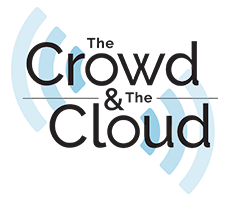
Newsletter
Sign up and stay in-the-know about The Crowd & The Cloud and the world of citizen science.

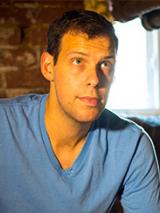
Tell us about yourself, how did you get involved in testing for lead in drinking water?
My name is Tony Spagnoli. During the day I'm an urban planner, and I work for an environmental nonprofit. I work mostly as a project manager on trails for bikes and hiking. I got involved tangentially in this lead in the water issue because we were on Facebook with a group of Philly urbanists talking about what was happening in Flint. This was early 2016 when the Flint water crisis had just begun, or was just coming to light. A couple of people were talking about, "Philly's an old city. Surely, there are many homes with lead water lines. What's happening here? Is it also a problem here? Is it also a problem in other cities?" The partner that I've been working with on this with said, "What if we got some tests and just figured this out ourselves?" I said, "That's a great thought. Let's do it."
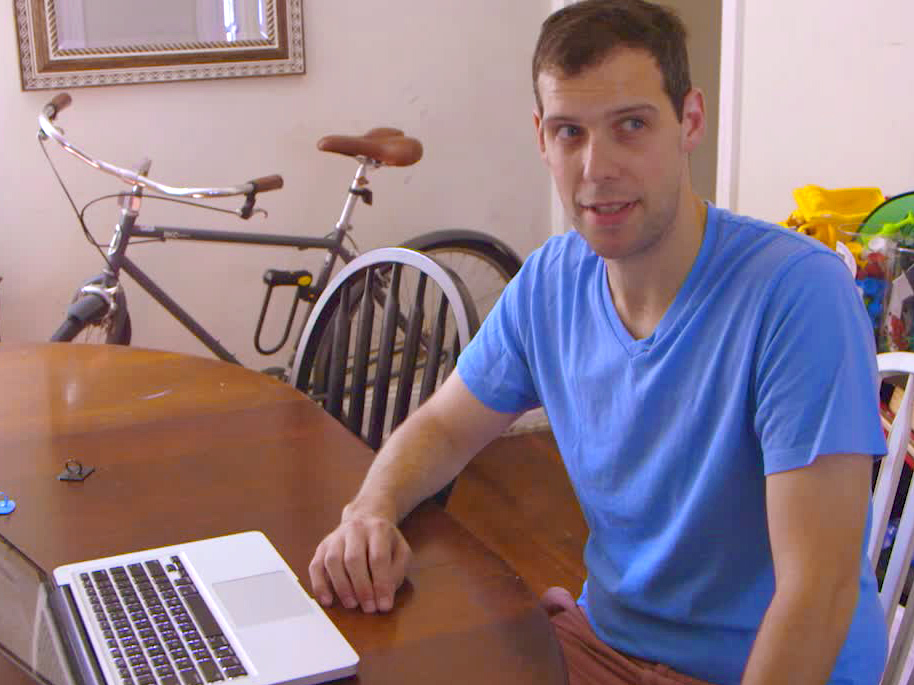
Tony at his computer; Philly Unleaded initially was founded through social media.
We sent a few messages on Facebook, and started thinking about how are we going to do this. We looked up where we could get water tests, researched best practices. Initially, we thought, "Maybe, we'll just buy a few dozen kits on Amazon and see if anyone is interested. We'll send them out, and just see what happens." With the idea that if anyone we knew wanted to test their homes independently, because there had been obviously some trust issues in Flint, that they could do that. Hopefully, they could do it cheaply.
My partner, Jonathan King, had begun looking into more of the science behind this and connected with the folks at Virginia Tech, who obviously had done the testing in Flint. We knew they were reputable, well respected, and had the actual science credentials to do justice to what we hoped would shed some light on what's happening in our own city. That’s how we got in touch, we just reached out to them.
How did Virginia Tech get involved?
They were able to provide us with the resources that we needed to make sure we were doing tests that met Federal EPA guidelines and that would be respected once we got the results in.
One thing we wanted to avoid is we do a bunch of tests, and then we're immediately shot down by the powers that be because the tests were done incorrectly, or they weren't to the standard protocol that the EPA sets. We felt confident, working with Virginia Tech, that we would meet those guidelines and that we would be supported once our research was complete.
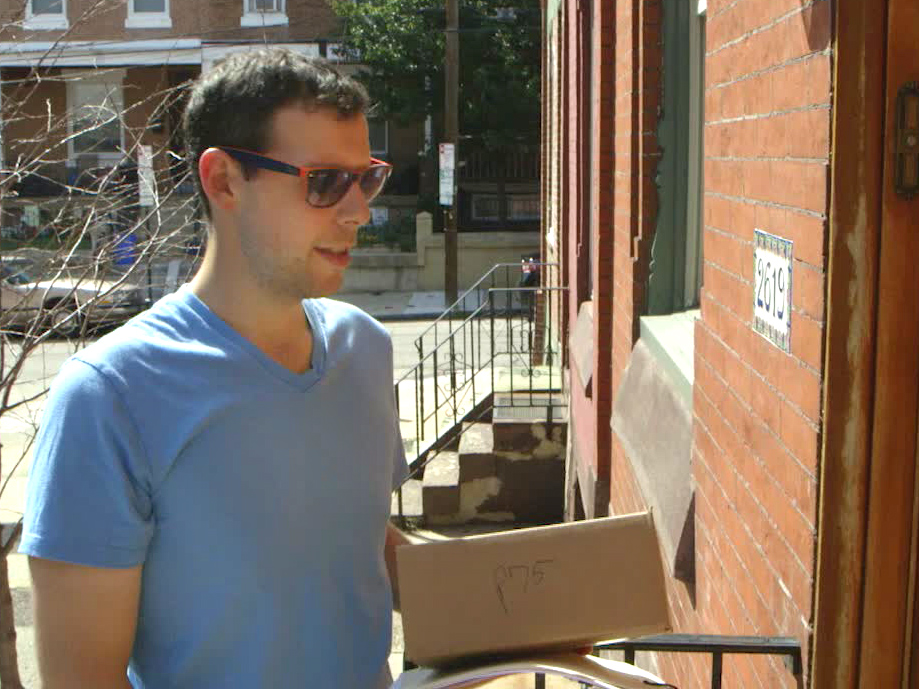
Tony delivering a lead-in-water testing kit to a local Philly resident.
How do you make sure you get citywide testing?
We've just gotten the kits in. What we're doing now is trying to distribute them geographically across the city so we can then get them out to each neighborhood. Philadelphia is a city of many neighborhoods. It's a big city, it's hard to get around. We wanted to make sure the people that sign up to do the testing have easy access. We're trying to eliminate as many barriers to this as possible because we want to get as many people involved as possible.
It'll be pretty easy for those who sign up to come to one of our homes, pick up the test, do their water testing, and then drop it back off to us. We hope by doing that we've eliminated a bunch of barriers and we get more participation, more people who take the tests and return them to us. That's obviously the most important part.
How are you using social media as a tool to get the word out?
We've got pretty limited resources. We're a couple of citizens who are trying to do something, a little bit bigger than we originally intended it on being, in a good way. The tools that we're primarily using are social media and electronic resources to get the word out. Through a pretty limited reach, we have gotten already 115 people to sign up. We're hoping to get that to two or three hundred within the next couple of months. That's been primarily through Facebook. There's been some media, too, that has helped support our project.
We've really been able to really touch base with citizens geographically dispersed throughout the entire city. Which is terrific, and that's what we need for the project to be successful. We need geographic and economic diffusion. One thing that we wanted to do originally was that we wanted anyone who wanted to test their homes to be able to test their homes. We thought, "OK, we'll have people pay for them. That shouldn't be a big deal, the tests aren't terribly expensive. They're about $65." But we also knew that could be a barrier to some families. We thought about different ways around that. We thought about looking for a grant opportunity, seeing if we could privately fund it. I think ultimately our decision was the simplest one that we could figure out, which was when people signed up we'd ask them if they want to test their home and purchase a kit. We'd also ask them if they couldn't afford to purchase a kit.
There was no criteria. It was just if you said you couldn't afford it, we assumed you couldn't afford it. Then a third question was, "Would you like to pay for your kit and to pay for someone else's?" That's been really amazing, because what we found was that we've actually gotten more people to say that they would pay for another home's kit than we have people that need additional help to pay for a kit. We now have an abundance of people who are willing to pay for kits. We'll be able to test as many of the homes that couldn't afford it that need to at the rate we're going.
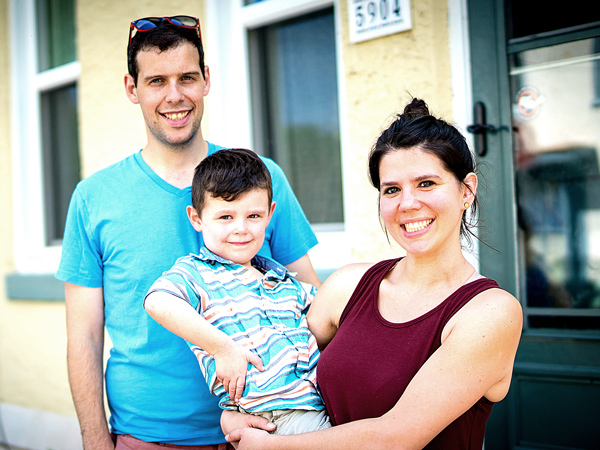
Tony and his family.
Do you think that if you guys hadn't gotten together and pushed this forward that testing would have happened in Philadelphia?
There's certainly been pressure, particularly from outside media organizations, that have been looking at what's going on in Philly and questioning, is there a problem. I think what's really put the pressure on the Philadelphia Water Department, and what's really spoken to its citizens, is the fact that we're doing this testing as a citizen-led effort. It's not coming from some reporter trying to get a story. It's not coming from a politician trying to make a name for himself. It's coming from people like us who have nothing more to lose or gain from this than just finding out what's going on in our own homes.
I have two small children. I live in a house that was built over a hundred years ago. Now, I know that I have a lead service line. It's about what can we do for ourselves right here in Philadelphia. I'm not sure if the testing would have necessarily gotten underway if we hadn't taken the initiative to make something happen. We do it as we can, bit by bit. We try to make it work. I think the key to it is just persistence. There were a couple times where I thought, "Maybe this isn't going to work out, and we should just drop the whole thing." Luckily, other people have intervened and added a little pressure, stoked the fire a little bit, and it's caused us all to keep thinking about this and keep pressing it forward. I'm glad that we've done that. It does take time, but important things take time.
